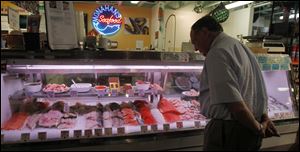
Recent studies suggest consumers need to become more knowledgeable about their food purchases
Integrative Medicine: Food purity
4/5/2013
A customer shops for seafood at Monahan's Seafood in Ann Arbor, Mich.
In the United States, we like to think that the foods we purchase are not only free from contaminants and toxins, but also contain what the label states. If a food is labeled “organic,” we hope that it has been brought to market with strict organic standards, and that it is largely pesticide-free and GMO-free. We also hope that fresh foods are properly labeled, and that manufacturers, grocers, and restaurants are honest about the content of the products that they sell.
However, a number of recent studies have suggested that buyers need to become more knowledgeable and savvy about what they’re buying, from stores as well as restaurants. Here’s a sampling of a few concerns:
—Oceana, an international organization that works to promote ocean conservation, recently published data looking at fraud in the seafood industry. In this study led by Dr. Kimberly Warner, researchers collected more than 1,200 samples of seafood from 674 stores and restaurants in 21 states and analyzed them using DNA testing to see if they were labeled accurately.
They found that one-third of all samples were mislabeled, some prominently so. In fact, 87 percent of snapper was mislabeled — less than 6 percent of all red snapper samples were actually snapper. Eighty-four percent of white tuna was also mislabeled — instead of tuna, consumers got escolar, a species of fish that can cause serious gastrointestinal distress in some people. And almost two-thirds of the “wild salmon” turned out to be farmed Atlantic salmon.
Farmed salmon is more likely to contain environmental toxins like PCBs and dioxins than wild salmon, an issue that is especially important for pregnant women and young children. Farmed salmon is also lower in omega-3 fatty acids than wild-caught salmon, and costs considerably less. King mackerel and tilefish, both of which are on the FDA’s “do not eat list” because of their high mercury content, were sold as grouper, halibut and red snapper.
Sushi restaurants were far more likely to sell mislabeled seafood than other restaurants or grocery stores — in this study, 74 percent of the sampled fish from sushi establishments was mislabeled. What is unknown at this point is where the dishonesty originates — whether it starts with the fishing industry, the middlemen, or stores and restaurants. What is clear, however, is that cheaper fish is often sold as a more expensive counterpart to the unsuspecting consumer.
—In 2011, Food Safety News published data looking at the purity of honey sold in U.S. retail outlets. They purchased honey sold in various stores in 10 different states and the District of Columbia, and sent them to Texas A&M University for analysis.
Researchers found that the majority contained no pollen, which is a marker of honey quality and also helps to identify where the honey came from. 100 percent of the honey obtained from large chain drugstores, as well as honey sold in small individual packets, had no pollen, while 77 percent of the honey from big-box stores was missing pollen.
Organic honey sold at farmers markets, co-ops and natural-foods stores tended to be reliable, however. Mislabeled honey is often diluted with cheap high fructose corn syrup or other illegal sweeteners; imported honey may also be contaminated with heavy metals and antibiotics, and when the pollen has been removed there is no way to trace the origin for that honey.
—Studies in recent years have shown that what is sold as extra-virgin olive oil is often anything but that: Olive oils are often mixed with other cheaper oils and then sold as the more expensive extra-virgin product. The country of origin may not be what is claimed, either.
The FDA doesn’t usually test imported olive oil for adulteration. Fortunately, you can perform a purity test at home: Put it in the refrigerator. Pure olive oil will thicken in the refrigerator; if your oil remains liquid and clear, chances are you’ve got a product that’s been cut with cheaper polyunsaturated oils like corn oil.
We applaud you for doing your best to be healthy by eating well, increasing your fish intake and using healthy oils like extra-virgin olive oil on your salads, along with a splash of organic honey in your green tea. Now we also encourage you to shop wisely to ensure that your hard-earned dollars are bringing home the quality of foods you deserve.